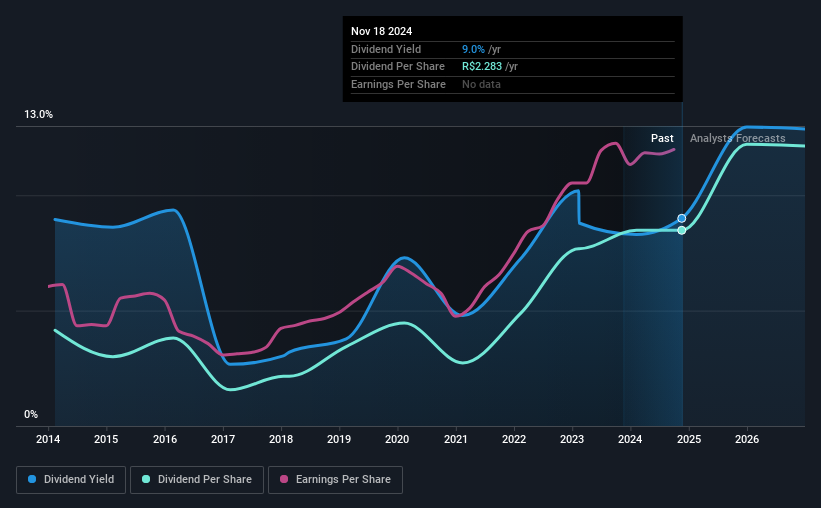Banco do Brasil (BVMF:BBAS3) Is Due To Pay A Dividend Of R$0.4833
The board of Banco do Brasil S.A. (BVMF:BBAS3) has announced that it will pay a dividend of R$0.4833 per share on the 6th of December. This means the annual payment is 9.0% of the current stock price, which is above the average for the industry.
View our latest analysis for Banco do Brasil
Banco do Brasil's Payment Expected To Have Solid Earnings Coverage
While it is great to have a strong dividend yield, we should also consider whether the payment is sustainable.
Banco do Brasil has a long history of paying out dividends, with its current track record at a minimum of 10 years. Past distributions do not necessarily guarantee future ones, but Banco do Brasil's payout ratio of 51% is a good sign as this means that earnings decently cover dividends.
Looking forward, EPS is forecast to rise by 34.2% over the next 3 years. Analysts estimate the future payout ratio will be 47% over the same time period, which is in the range that makes us comfortable with the sustainability of the dividend.

Dividend Volatility
The company has a long dividend track record, but it doesn't look great with cuts in the past. The annual payment during the last 10 years was R$1.12 in 2014, and the most recent fiscal year payment was R$2.28. This means that it has been growing its distributions at 7.4% per annum over that time. We like to see dividends have grown at a reasonable rate, but with at least one substantial cut in the payments, we're not certain this dividend stock would be ideal for someone intending to live on the income.
The Dividend Looks Likely To Grow
With a relatively unstable dividend, it's even more important to see if earnings per share is growing. Banco do Brasil has impressed us by growing EPS at 14% per year over the past five years. Since earnings per share is growing at an acceptable rate, and the payout policy is balanced, we think the company is positioning itself well to grow earnings and dividends in the future.
We Really Like Banco do Brasil's Dividend
Overall, we think that this is a great income investment, and we think that maintaining the dividend this year may have been a conservative choice. The company is easily earning enough to cover its dividend payments and it is great to see that these earnings are being translated into cash flow. Taking this all into consideration, this looks like it could be a good dividend opportunity.
Investors generally tend to favour companies with a consistent, stable dividend policy as opposed to those operating an irregular one. Meanwhile, despite the importance of dividend payments, they are not the only factors our readers should know when assessing a company. As an example, we've identified 1 warning sign for Banco do Brasil that you should be aware of before investing. If you are a dividend investor, you might also want to look at our curated list of high yield dividend stocks.
Valuation is complex, but we're here to simplify it.
Discover if Banco do Brasil might be undervalued or overvalued with our detailed analysis, featuring fair value estimates, potential risks, dividends, insider trades, and its financial condition.
Access Free AnalysisHave feedback on this article? Concerned about the content? Get in touch with us directly. Alternatively, email editorial-team (at) simplywallst.com.
This article by Simply Wall St is general in nature. We provide commentary based on historical data and analyst forecasts only using an unbiased methodology and our articles are not intended to be financial advice. It does not constitute a recommendation to buy or sell any stock, and does not take account of your objectives, or your financial situation. We aim to bring you long-term focused analysis driven by fundamental data. Note that our analysis may not factor in the latest price-sensitive company announcements or qualitative material. Simply Wall St has no position in any stocks mentioned.
About BOVESPA:BBAS3
Banco do Brasil
Provides banking products and services for individuals, companies, and public sectors in Brazil and internationally.
Established dividend payer and fair value.
Similar Companies
Market Insights
Community Narratives




